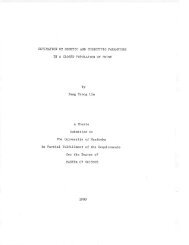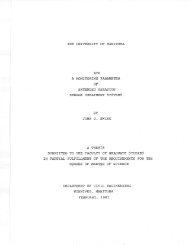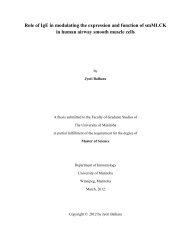- Page 1 and 2:
THE UNIVERSITY OF MANITOBA STUDIES
- Page 3 and 4:
To My parents and wife: Mn & Mrs. K
- Page 5 and 6:
CONTTNT S I. REVIEW 0N PLACENTAL PR
- Page 7 and 8:
V. RESULTS E. STUDIES ON THT BIOSYN
- Page 9 and 10:
Peptide Hormones: ACTH CG FSH GH LH
- Page 11 and 12:
LIST OF FIGURES FIGURE PAGE I Linea
- Page 13 and 14:
22 Radioreceptor assay for oPRL us.
- Page 15 and 16:
Effect of PGF,. and lactogenic horm
- Page 17 and 18:
ABSTRACT STUDIES 0N 0VINE PLACENTAL
- Page 19 and 20:
eceptor-b i nd i ng studies show th
- Page 21 and 22:
-2- years have seen an increasing i
- Page 23 and 24:
-4- secretion of a peptide hor:none
- Page 25 and 26:
NHt-Aì a-Pro-Asp-Val -Gl n-Asp-Cys
- Page 27 and 28:
6a NH, -Ser-Lys -G'l u.Pro -Leu -Ar
- Page 29 and 30:
-8- 197J-; Rayford et al | !9721 .
- Page 31 and 32: -10- sialic acid díd not alter the
- Page 33 and 34: -L2- and Biasucci (1969) denonstrat
- Page 35 and 36: _14_ addition of CAMP (Handwerger e
- Page 37 and 38: -16- conponents I the.faster haying
- Page 39 and 40: _18_ by hcc, as evidenced by increa
- Page 41 and 42: _20- (Mason et a1 , L973i Menon ¡
- Page 43 and 44: 21a NH, -Vaì -G1 n-Thr-Val -Pro-Le
- Page 45 and 46: -23- growth-promoting ef,fect, wher
- Page 47 and 48: -25- diffusion teÊt. Josi¡novich
- Page 49 and 50: -27- v¡hereas in the tissue extrac
- Page 51 and 52: -29- found products of molecular we
- Page 53 and 54: -3r- vÍii) S.ecreLion and metabol
- Page 55 and 56: - 33 - metabolic factors may influe
- Page 57 and 58: -35- Although hpI, si¡nuLates the
- Page 59 and 60: -37- C. CIIHER ITUMAN PLACENTAL PEP
- Page 61 and 62: _39_ stimulating activityf is found
- Page 63 and 64: -4t-- (iii) Human Chorionic Cortlco
- Page 65 and 66: - 43 - syncytiotrophoblast (Tatarin
- Page 67 and 68: - 45 - Ib SUBPRTMATE PLACENTAT PR.O
- Page 69 and 70: -47 - samples, signif,icant elevati
- Page 71 and 72: -49- required for the chorignÍc ao
- Page 73 and 74: B. (i) -51 - MONI(ET PLACENTAL I,AC
- Page 75 and 76: - 53 - brith 13 minutes for hpl,. T
- Page 77 and 78: 55 Pregnarit Marê Sêrum Gonâdót
- Page 79 and 80: II b. NON - pRl¡late PT,ACENTAT.
- Page 81: (iv¡ Inmuhologicat Mêthogs: - 59-
- Page 85 and 86: 63 Ordêr Rodêhtia (Tat, nicê, ro
- Page 87 and 88: Guinea Pi g: 65 Hypophysectomy of t
- Page 89 and 90: -67 Orilet Perissodactyla (Horse an
- Page 91 and 92: -69 activity in the N-acetyl-lactos
- Page 93 and 94: (Íi) coat: -71 The goat is a spont
- Page 95 and 96: - 73- When serum from a pregnant go
- Page 97 and 98: -75 Gusdon et al (1920)using . haer
- Page 99 and 100: 77 (c) Imnunologicaì Properties of
- Page 101 and 102: -79 - SECTION II : OYINE REpROpucTI
- Page 103 and 104: BI which contain' as lvell as the o
- Page 105 and 106: 83 ce11s usually contaln either num
- Page 107 and 108: 85 non-pregnant values did not diff
- Page 109 and 110: 8rl Leaf blank to corect nr.rmberin
- Page 111 and 112: - 89- luteolysis when supesistpessd
- Page 113 and 114: 9t SECTION IV¡ MtTttODs AND IIATER
- Page 115 and 116: - 93- (.TCA) solution were added co
- Page 117 and 118: -95 - (ÞPRL' NIH-P-B3) , and all q
- Page 119 and 120: 97 buffer, the eluates were pooled,
- Page 121 and 122: Char4ctêf ization Pfocedures l. Ch
- Page 123 and 124: t0t (c) À.nalvticaL .{rod.iu¡n do
- Page 125 and 126: 103 B : MFTÍÍOD OF DETECTION AND
- Page 127 and 128: AFsa)¡- ProceiiureS 105 Specific b
- Page 129 and 130: 107 ', C : IIEBI{OÐ OF DEVELOPMENT
- Page 131 and 132: 109 D. RTNG PREGNôXCY (l) Maternâ
- Page 133 and 134:
l1ì (wtlvo'). After the hornogenat
- Page 135 and 136:
(4) Tissúe distributiori df radloi
- Page 137 and 138:
l'1 5 (2) Procg.ssjnq, gf. incuÞ¡
- Page 139 and 140:
1.l7 for 30 min. Then the precipita
- Page 141 and 142:
(2) Assav of ìuteo.trgpic effec.t
- Page 143 and 144:
EXPERIMENT # TI (7 days after HCG)
- Page 145 and 146:
123 to progesterone (l/300 djlution
- Page 147 and 148:
SECTION V : RESULTS (r) LACTOGEN DU
- Page 149 and 150:
127 Fractioñâtión of oPL. from c
- Page 151 and 152:
129 Figure 6. carborymethyì(cM,)-c
- Page 153 and 154:
t 3't óo0 ,oo 800 900 FRACIION r,t
- Page 155 and 156:
E o ø ô¡ t- z ao É, o '133 .--.
- Page 157 and 158:
TABLE I TABLE OF PURIFICATION OF OV
- Page 159 and 160:
137 Figure lì. A, Poìyacrylamide
- Page 161 and 162:
Leaf blank to correct nr.rmbering
- Page 163 and 164:
14r Anal.vtical Sodi um Dodecyl Sql
- Page 165 and 166:
o 9 x F- -)- 9 rU I æ -t f () LT'
- Page 167 and 168:
¿ o s : t45 Figure 15b. Displaceme
- Page 169 and 170:
HoR MoNE coNc€NrRArto ln ß/mt )
- Page 171 and 172:
Tissue used for binding ôtudies Li
- Page 173 and 174:
Noñ. p..s'ro¡r {N,p.l Pr.eñonr (
- Page 175 and 176:
¡( É T 2, \ ¡a.2¡./ir ,..r.¡.
- Page 177 and 178:
P 80 \ x.. ¡,azrot¡j .1.¿¡i¡ .
- Page 179 and 180:
o c o U o òs -o c2o ao eÀo o 'o .
- Page 181 and 182:
F 2 o o o\ ¡¡ig ô 2 Þ 0 (¡ l5e
- Page 183 and 184:
! o 't6 l HORMO¡¡ E COr{CENr FAIt
- Page 185 and 186:
163 Figure 24 shows the sensltivity
- Page 187 and 188:
165 D. STUDIES ON THE SECRETION OF
- Page 189 and 190:
E .Dc À o - art & 167 Flgure 26. P
- Page 191 and 192:
lJhen blood samples were taken four
- Page 193 and 194:
Sheep no. l{6 25í 960 464 5?0 680
- Page 195 and 196:
't73 fetal cotylêdons at various d
- Page 197 and 198:
TABLE VI OPI CONCENTRATTON IN FETAL
- Page 199 and 200:
l. Súrglcat Method 't77 Figure 3l
- Page 201 and 202:
= >€ ,3 ; I 179 rwt 76-0450 o----
- Page 203 and 204:
dUrlng PrêOnancy in thè Ewes tBr
- Page 205 and 206:
! ñ' l83 NoRMON! C oNCENTßArlO þ
- Page 207 and 208:
l ol
- Page 209 and 210:
I I I "+ _t rl \l :- 'i rl -l l87 a
- Page 211 and 212:
l89 Flgure 37. Percentage ot l2sl-o
- Page 213 and 214:
19t column is shown in Figure 3BA.
- Page 215 and 216:
- 193 3H -couNdro _________SPECtFtC
- Page 217 and 218:
TABLE IX /- BIOASSAY OF qROIItIfH p
- Page 219 and 220:
z o 197 Figure 40, Radioreceptor as
- Page 221 and 222:
5A L lNl Pgtzq cô-tlzt Pgfl6 + cl
- Page 223 and 224:
SFCT.IoN II : pl.scussr0N 4d ã 1È
- Page 225 and 226:
Ch aracteri zati on 203 Analytical
- Page 227 and 228:
205 size, corresponding to the mole
- Page 229 and 230:
207 the specific binding of oPL to
- Page 231 and 232:
209 than with prolactin-like effect
- Page 233 and 234:
2t1 the jncrease in oPRL binding si
- Page 235 and 236:
213 The resuìts obtained indicate
- Page 237 and 238:
215 on the role af PL in the fetus.
- Page 239 and 240:
Surgi ca1 method- 217 Our studies o
- Page 241 and 242:
219 5.Relationships amonq opRL. oGH
- Page 243 and 244:
221 The nature of thelarge nolecula
- Page 245 and 246:
223 data argue for a close interact
- Page 247 and 248:
]. TABLE OF CHEMICAL PROPERTIES GUI
- Page 249 and 250:
cor,t coAT (bPL) (cpl) 3. TABLE OF
- Page 251 and 252:
À) E 229 Figure 43. The secretion
- Page 253 and 254:
231 H. POSSIBLE ROLT OF OVINE PLACE
- Page 255 and 256:
233 Our studies on the blnding of o
- Page 257 and 258:
235 through its binding to cotpus l
- Page 259 and 260:
237 Furthermore, oPL neasurement in
- Page 261 and 262:
239 circulationand alìantoic f'lul
- Page 263 and 264:
SECTICN IX PUBLICATIONS A) Manuscr
- Page 265 and 266:
SECTION X: BIBLIOGRAPHY Abramovich,
- Page 267 and 268:
Beas,F., Saìinas, 4., GonzalezrF.,
- Page 269 and 270:
247 Brody,S,, and Carlstrom,G.,J.Cl
- Page 271 and 272:
249 Crosignanì ,P.G. , Nencioni ,
- Page 273 and 274:
25t Friesen,H.G., Endocrinoìogy 76
- Page 275 and 276:
253 Grinwich,D.L., M. Hichens, and
- Page 277 and 278:
25s Hum, V.G., Knipfel , J.G., and
- Page 279 and 280:
?57 Knopp,R,H,, H,J. Ruder,E. Herra
- Page 281 and 282:
259 Manku,M.S., and D.F. Horrobin,
- Page 283 and 284:
261 , :iir .,.-;;r-,:, Morgan, F.J.
- Page 285 and 286:
263 Pierce,G.B., Midþley,A.R. and
- Page 287 and 288:
?65 Shepard, T.H.., Gen. Comp. Endo
- Page 289 and 290:
267 Tsuruhara,T., Dufau,M.L., Hickm



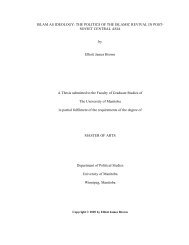
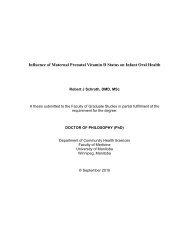
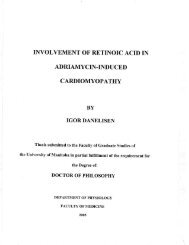
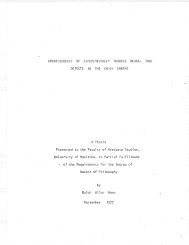
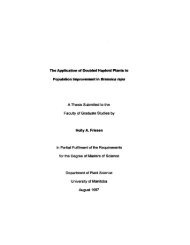
![an unusual bacterial isolate from in partial fulf]lment for the ... - MSpace](https://img.yumpu.com/21942008/1/190x245/an-unusual-bacterial-isolate-from-in-partial-fulflment-for-the-mspace.jpg?quality=85)
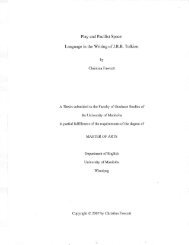
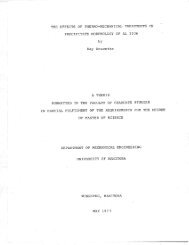
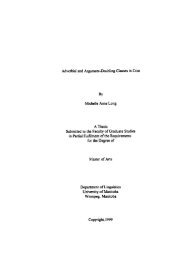
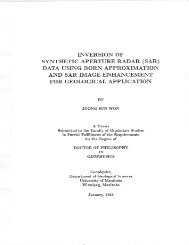

![in partial fulfil]ment of the - MSpace - University of Manitoba](https://img.yumpu.com/21941988/1/190x245/in-partial-fulfilment-of-the-mspace-university-of-manitoba.jpg?quality=85)
